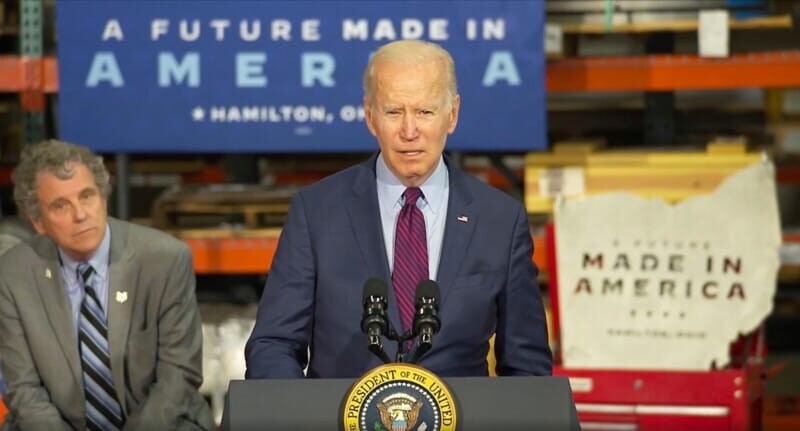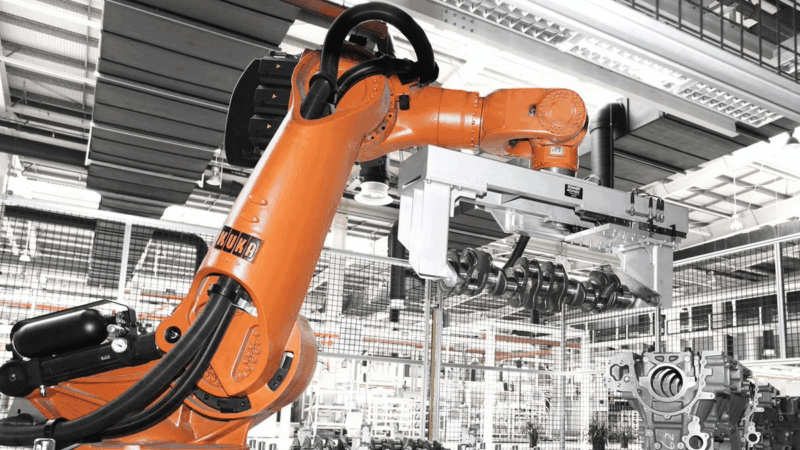
AM Forward Program: Everything You Need To Know
On Friday, May 6, 2022, President Biden announced the launch of a new program called “Additive Manufacturing Forward'' (AM Forward).
This federal initiative aims to use today’s 3D printing technologies to improve supply chain resilience for American manufacturers. By accelerating adoption of additive manufacturing (AM) across small and medium-sized companies, each of these AM-powered manufacturers will in turn contribute to building resilient supply chains for the U.S.-based domestic manufacturing ecosystem, while also using 3D printing to improve their industrial competitiveness.
This article provides an in-depth breakdown of the 2022 Additive Manufacturing Forward program — explaining the details of the initiative, why it was launched, what it seeks to accomplish, who is involved, what AM is (and its benefits over traditional manufacturing), and a list of related federal programs that support U.S. SME manufacturers adopt additive.
What is Additive Manufacturing?
Additive manufacturing (AM), referred to more colloquially as 3D printing, is a suite of technologies that build 3D-printed objects layer-by-layer. Using slicer software and 3D printer machines, additive manufacturing allows digital inputs (typically in the form of CAD files) to be converted into physical 3D objects, such as industrial parts.
Additive manufacturing technology is a methodical contrast to subtractive manufacturing, the latter of which produces the final result through the reduction of material, such as cutting away sections of an alloy to make a bolt or hinge.
3D printing can be employed to replace traditional manufacturing methods for certain applications, or augment them with the following benefits:
- Manufacture parts one at a time, as needed
- Manufacture parts with complex geometries that can’t be made through traditional manufacturing methods
- Reduce the number of parts needed for an application
- Bring down the cost per unit of low-volume parts
- Reduce lead times for parts, by printing them on-demand at the precise point of need
- Circumvent logistical complications of shipping parts between locations
With advances in the capabilities of today’s additive manufacturing technologies, its benefits can extend to a diverse range of industries and uses. Plastics and metals alike can be 3D printed, embraced even by manufacturers in specialized, highly-regulated industries such as the aerospace sector.
Additive manufacturing is a technology native to Industry 4.0, which refers to the broader digitization of manufacturing with rapidly-growing technologies such as cloud connectivity, big data, smart sensors, artificial intelligence (AI), and advanced automation.
What is Additive Manufacturing Forward?
AM Forward is a federal program that was launched on May 6, 2022. As described by an official statement from the White House, AM Forward is “a voluntary compact between large, iconic manufacturers and their smaller U.S.-based suppliers.”
Currently, the program has seven large manufacturers as its initial participants. Each of these large manufacturers will provide support for their smaller, domestically-based suppliers in the U.S., assisting in their adoption of additive manufacturing.
This will be achieved through each of the five participating large manufacturers publicly committing to the following:
- Purchasing parts made with additive manufacturing from their smaller, domestic suppliers
- Providing additive manufacturing training for the employees of their smaller, domestic suppliers
- Providing technical assistance to support the additive manufacturing adoption of their suppliers
- Contribute to the development of common standards and certification for additive manufacturing technologies and products
Why was AM Forward launched?
In response to global supply chain disruptions, the AM Forward program was launched to help build domestic supply chain resilience, while improving industrial competitiveness of small to medium-sized U.S.-based manufacturers. By building more resilient supply chains domestically and reducing reliance on international suppliers, the cost of goods manufactured will drop: this in turn will combat inflation rates.
The White House identified additive manufacturing as an instrumental technology to achieve this. Increased adoption of AM amongst small to mid-sized suppliers in the U.S. would build far more resilient supply chains for the domestic manufacturing ecosystem, while fostering innovation.
Therefore, AM Forward seeks to eliminate barriers to AM adoption for these suppliers. Amongst small to medium-sized suppliers in the U.S., main barriers to adoption include:
- uncertainty about demand of additively manufactured parts
- lack of resources to programmatically implement additive manufacturing at a meaningful scale
The AM Forward program, through the commitments of the five large manufacturers, addresses these barriers by providing assurance of demand along with technical assistance for implementing and scaling additive manufacturing operations.
What is the purpose of AM Forward?
AM Forward seeks to bring cutting-edge additive manufacturing capabilities to the partnering supplier businesses. This boosts the industrial competitiveness for them and the large manufacturers alike: a consistent inward flow of AM-produced parts from external suppliers will help the large manufacturers qualify and implement more AM-produced parts in the designs of their own projects.
Key goals outlined in the White House’s announcement of Additive Manufacturing Forward include:
- Building more innovative and resilient supply chains for domestic U.S. manufacturers, by investing in bringing additive capabilities to small and medium-sized companies
- Reducing barriers to adoption for innovative technologies like additive manufacturing, while fostering growth of Industry 4.0 and advanced manufacturing technologies
- Having more items both invented and manufactured within America, by investing in adoption of 3D printing technologies in regional manufacturing ecosystem
Large manufacturer participants in AM Forward
The initial participants in AM Forward are seven large manufacturers — GE Aviation, Honeywell, Lockheed Martin, Raytheon, Siemens Energy, Boeing, and Northrop Grumman — as well as their network of domestic, U.S.-based suppliers, which are small to medium-sized manufacturers.
Assisted by these five large manufacturers, the primary recipients of additive manufacturing technology will be their vast network of domestic U.S. suppliers, which are small to medium-sized businesses. The five large manufacturers rely upon these domestic suppliers for many of their critical supply chain activities.
Additionally, the Applied Science & Technology Research Organization of America (ASTRO America) will be advising the program on technology, standards, and will ultimately serve as the program coordinator. Due to each large manufacturer’s breadth of activities and needs for AM-specific applications, many different types of AM equipment are likely to be utilized in the program.
The White House’s announcement of AM Forward states that any OEM can participate. Participation is voluntary, but requires a public commitment to support the adoption of industrial 3D printing for their suppliers.
Current public commitments from large manufacturers
As of the program’s launch, these are the stated public commitments from the initial large manufacturer participants (source: whitehouse.gov):
- GE Aviation: 50% of their requests for quotes for additively manufactured products will target competition between domestic SME suppliers. GE Aviation will also seek to source 30% of externally produced AM-built parts from domestic SME suppliers.
- Raytheon: They will help simplify and accelerate procurement process for AM parts; will involve SME manufacturers in over 50% of its requests for quotes on additively manufactured products.
- Siemens Energy: 20-40% of their externally-sourced additively manufactured parts will be purchased from domestic suppliers and partners. Siemens Energy will aid 10-20 domestic SME suppliers in improving AM capabilities and implementation. They will also train 10-20 domestic SME suppliers on best practices for post-processing and part inspection.
- Lockheed Martin: will work in conducting joint research programs with its domestic SME suppliers. Research will focus on improving additive manufacturing’s performance as an alternative to castings and forgings. Furthermore, Lockheed Martin will seek to foster the development of additive manufacturing talent for the workforce: through participation in university programs with coursework and apprenticeships.
- Honeywell: domestic SME suppliers will be targeted to compete on their request for quote packages for products and services that use additive manufacturing. This includes tooling, machinery, process development, and other products. They will also assist their domestic SME suppliers in part design, data generation, machine operation, post-processing, part inspection, and quality management.
- Boeing: will increase SME suppliers competing over quote packages for products that involve additive manufacturing. Boeing will also increase its capacity for qualified SME suppliers by 30%, while providing technical assistance for qualification requirements.
- Northrop Grumman: will increase SME suppliers competing over quote packages for products that involve additive manufacturing.
How can I get involved?
We highly recommend signing up for updates at the ASTRO/AM Forward Website. If you are a potential or current supplier for one of the five partner businesses (GE Aviation, Honeywell, Lockheed Martin, Raytheon, Siemens Energy, Boeing, and Northrop Grumman), there is a substantial chance that ASTRO will be getting in touch with you. Additionally, the success of this initiative's first year will dictate adoption across additional OEMs and supplier networks. In any case, it doesn’t hurt to write a letter to your representatives and senators voicing your support for AM Forward!
More federal programs supporting SME manufacturers
Along with AM Forward, here is a list of other federal programs that can help small to mid-sized manufacturers in the U.S. successfully adopt additive manufacturing technologies, and increase their industrial competitiveness. These include:
Providing accessible financing to domestic SME suppliers to support installation of AM systems, through:
- The U.S. Department of Agriculture’s Business and Industry program
- The Export-Import Bank’s new domestic lending program
- The Small Business Administration’s 504 Loan Program and Small Business Investment Company (SBIC) program.
Technical assistance provided by the federal government and OEMs, through:
- For SMEs, testing of various AM technologies and techniques will be available at the Department of Energy’s Manufacturing Demonstration Facility at Oak Ridge National Laboratory.
- The Manufacturing Extension Partnership will provide SMEs with advanced technical assistance.
- The Department of Defense (DOD)’s Mentor Protégé Program reimburses what it costs for OEM participants to provide technical assistance to small U.S. suppliers with economically disadvantaged owners.
- AM Forward participants will collaborate with America Makes to develop an AM training curriculum for the workforce. With assistance from the U.S. Department of Labor, they will create AM manufacturing programs.
The Bipartisan Innovation Act
The Bipartisan Innovation Act is set to go before Congress this summer. If voted in and signed into law by President Biden, the U.S. Department of Commerce will establish the Office of Supply Chain. In Coordination with ASTRO, the Office of Supply Chain will oversee the implementation of AM equipment, starting with 12 SMEs designated as early adopters, and later, a broader network of suppliers.
The Bipartisan Innovation Act will invest in regional tech ecosystems, support the development and growth of advanced manufacturing technologies such as AM, and increase funding for Manufacturing USA Institutes and the Manufacturing Extension Partnership.
Helpful Reading

3D 프린팅을 통한 5가지 공급망 혁신

Industry 4.0 in the Context of Professional 3D Printers
All of the blogs and the information contained within those blogs are copyright by Markforged, Inc. and may not be copied, modified, or adopted in any way without our written permission. Our blogs may contain our service marks or trademarks, as well as of those our affiliates. Your use of our blogs does not constitute any right or license for you to use our service marks or trademarks without our prior permission. Markforged Information provided in our blogs should not be considered professional advice. We are under no obligation to update or revise blogs based on new information, subsequent events, or otherwise.
새로운 정보를 놓치지 마세요
Markforged의 최신 컨텐츠를 편지함으로 받으시려면 구독하십시오.
